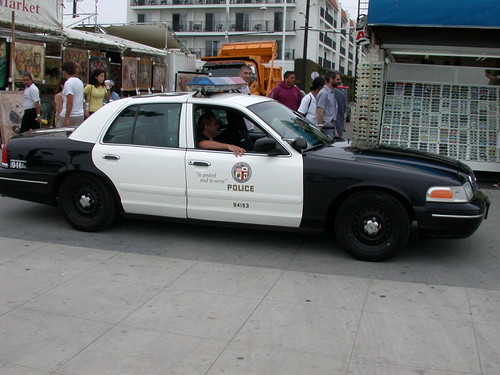We run our website the way we wished the whole internet worked: we provide high quality original content with no ads. We are funded solely by your direct support. Please consider supporting this project.
Is Racism Still a Problem? Does the Church Care?
On Friday, we posted a piece by Greg on the importance of racial reconciliation in the Kingdom of God. (Click here to read it.) This is a part of the Synchro blog for MennoNerds on Race. Watch this video for more on the topic. The following is an illustration taken from an early draft of a chapter on this topic in Greg’s book The Myth of a Christian Religion.
________________
Several years ago I was listening to a Christian radio talk show that was discussing the issue of “racial profiling.” It was in response to a study that demonstrated that in Minnesota (the liberal North!) black men were much more likely to be stopped in their cars by police than white men. The white host of the show expressed his opinion that the study had to be flawed and that racial profiling is very rare. He then took calls from the audience.
The arrogance of the talk show host amused me. But the next half hour of call-ins left me dumbfounded.
One caller early on identified himself as African American. He gave two examples from his own life of being pulled over and questioned by police for no legitimate reason. Not surprisingly, while he said he believe most white police officers were fair and that few are consciously racist, he nevertheless believed racial profiling was a problem in the police force.
All the remaining callers identified themselves as white, and without exception, each denied racial profiling was a problem. Some even expressed anger over the African American caller who suggested otherwise. Several said they were sick and tired of blacks “playing the race card.”
Now think about this. If racial profiling was in fact at times happening, how would any of the white callers know about it? By definition, it wouldn’t be happening to them. The only way white folks could learn about racial profiling, if it in fact takes place, would be to learn about it from the one’s who get profiled. Yet, this was the very thing all the white callers on the station seemed unwilling to do. Instead, because racial profiling never happened to them, they insisted it simply doesn’t happen.
Sitting at the top of a pyramid of privilege that affords us white folks the luxury of hovering above a world of racialized walls many others have to contend with, it’s possible for us whites to remain blissfully unaware that our “normal” is not necessarily other people’s “normal.” And this is why many whites have trouble understanding systemic racism and why many see reconciliation as a minor, optional, addendum to the Gospel.
Category: General
Tags: Kingdom Living, Mennonerds, Myth of a Christian Religion, Racial Reconciliation, Racism
Topics: Ethical, Cultural and Political Issues
Related Reading

If you really want to defend the poor from Caesar, shouldn’t we use the political means that exist? It’s easy to make your argument when you are in a position of privilege.
Question: I’ve been reading your blogs for a while. I’ve read multiple texts written by you and it’s difficult to listen much longer as someone in poverty. It’s easy to make your argument when you are in a position of privilege. The Church doesn’t have the power and resources to help the poor everywhere. Christians…

What’s Wrong With The World?
Hartwig HKD via Compfight The reports coming out of Fort Hood this morning once again highlight that our world is messed up. And it often feels like we are rearranging the deck chairs on the Titanic as we try to find answers to address the problems we face. Here are some reflections by Greg on…

Following Jesus Doesn’t Work
I met a middle aged woman one day who told me she had given up on Christianity. “It just didn’t work for me,” she said. My response was: “What on earth made you think Jesus was supposed to work for you? The truth is that you were supposed to work for him.” The sentiment is…

Counter-Cultural Community
Jessica Lucia via Compfight On Tuesday Greg tweeted, “We inevitably acclimate to our environment. We can’t hope to be counter-cultural unless we’re embedded in a counter-cultural community.” Surely almost all Christian leaders would agree with this. But what does a counter-cultural community look like? How do we relate to one another and to the world…

When Technology Becomes an Idol
Our dear friend Bruxy Cavey wrote this reflection on how technology can contribute to spiritual apathy. Has technology replaced God in ways you may not have noticed? It’s good to “unplug” on a regular basis to reconnect to the real source of our LIFE. From the article: The Internet robs us of our sense of our…

Confessions of a Christian Nation (Racism)
In honor of Dr. Martin Luther King Jr., Greg Boyd, Brian McLaren and Brian Zahnd apologize to the African American community for the church’s complicity in the oppression of African Americans throughout American history. Video by Rex Harsin

